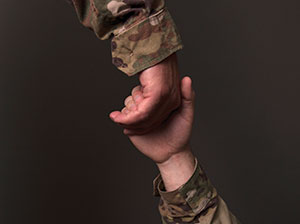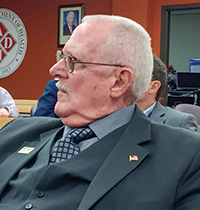
Arkansas DAV chapter uses grant from Columbia Trust for suicide prevention program, sees dramatic decrease in local county
When officials from the Little Rock VA Medical Center contacted DAV Chapter 30 in Mountain Home, Arkansas, they made a simple yet important request: Can you help set up a community meeting so we can discuss veteran suicide? Understanding the severity of the epidemic in their local area at the time, chapter leaders were happy to oblige.
“We were expecting them to give a presentation and share some statistics,” Dan Hall, a Marine Corps veteran of Vietnam and commander of Chapter 30, said of the 2015 meeting. “But most importantly, we were hoping they had some sort of prevention plan to share with us that we could implement.”
Instead, according to Hall, the officials told the estimated 75 people who gathered for the meeting that Baxter County, with its population of roughly 42,000, had the highest suicide rate in the state—2.2 per month—and that the problem needed to be addressed.

“They basically came in, told us we had a suicide problem and left,” said Dr. George Wolford, an Army veteran of the Vietnam era and chaplain of Chapter 30. He also said chapter members felt the solutions for the crisis needed to be proactive and vigorous.
“Our [solution] was going out and finding people at risk for suicide,” said Wolford.
“We took [the VA’s visit] personally and decided that, to be successful, we had to make it a community effort,” added Hall.
But Hall and Wolford immediately knew they were faced with a number of problems, specifically access, education and finances.
“The VA and DAV chapters and [other veterans groups]—that’s not where you go to find the veterans who need help,” said Hall, who noted that 76% of the veterans who die by suicide are not in the VA system and generally not involved in the veteran community at all.
To gain access to these veterans, they knew the community needed to be educated on warning signs of suicide so residents could alert the chapter of an at-risk veteran. These signs include, but are not limited to, marital and other relationship problems, financial hardships, professional issues, housing and mental health issues.
Educating the community meant Hall and Wolford required funding beyond the chapter’s means, so the duo began submitting funding requests to DAV and other similar organizations, as well as the VA, and in 2018, Chapter 30 received a grant from DAV’s Columbia Trust.
“One of the most successful functions of the Trust is bridging resources from well-populated departments and chapters to those in need,” said National Service Foundation President Arthur H. Wilson. “The funding is used for service initiatives like Chapter 30’s suicide prevention program, which they otherwise couldn’t afford to offer veterans in their communities.”
With funding in hand, as well as other grants from the VA and state of Arkansas, Chapter 30 was able to create a website, public service announcements and billboards and to establish a training program to help residents identify at-risk veterans.

“They helped us put this program together, and it became a whole lot bigger than just a DAV chapter; it became a community effort,” said Hall.
Hall added that besides himself and Wolford, who holds doctorates in both clinical and community psychology, the chapter has been able to train two members of the local sheriff’s department; two local school resource officers; regional medical center personnel; local clergy; and members of the Good Samaritan Society, in which a third of local members are veterans.
“One of the first things people ask when they encounter me is, ‘Are you the guy from the VA?’ I tell them, ‘No, I’m not from the VA,’” said Wolford. “‘I’m from Disabled American Veterans, and I’m not paid by anybody. I’m here because I want to be.’ And when I say that, you can just see the tension melt.”
Wolford now has a list of about 30 veterans he calls at least once a week to check on. He sometimes meets them for a meal. Other times he gives them rides to support meetings. But he is always there to listen and help.
“Don’t be afraid to ask the question: ‘Are you considering suicide?’” said Hall. “And if they indicate they are, then the job is to persuade them that that’s kind of a permanent solution to a temporary problem—there are resources, and you’re not alone.”
And their efforts have paid off. When the program began in 2015, Baxter County experienced 26 suicides per year. That number fell to 16 suicides per year in 2018. In 2021, there have been three suicides for the entire year.
“It’s not our credentials that get this job done,” Wolford said. “It’s just that we got off our butts and did something. Anybody can do it.”






